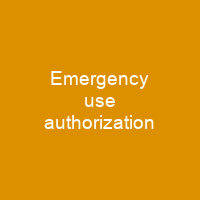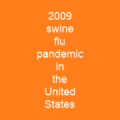An Emergency Use Authorization is an authority granted to the Food and Drug Administration. It authorizes FDA to facilitate availability of an unapproved product. EUAs may be applied to drugs, devices or biological product. They can only be implemented during a public health emergency.
About Emergency use authorization in brief

The FDA issued Emergency Use Authorizations to make available diagnostic and therapeutic tools to identify and respond to the 2009 swine flu pandemic under certain circumstances. The agency issued these EUAs for the use of certain powerful antiviral drugs, and for the quantitative PCR Swine Flu test. On April 22, 2013, the FDA issued an EUA for the CDC Human Influenza Panel-Influenza AH7 Assay. This test is the presumptive detection of novel novel virus A.
You want to know more about Emergency use authorization?
This page is based on the article Emergency use authorization published in Wikipedia (as of Nov. 10, 2020) and was automatically summarized using artificial intelligence.







